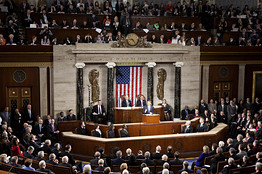The President's Speech Impediment
The grander the stage, the smaller Mr. Obama comes across.
By William McGurn
WSJ.com
In everyday life, when you don't have something to say, you avoid the stage. In our nation's capital, by contrast, the world operates like the one Alice found behind the Looking Glass. That's a world where you have to run as hard as you can just to stay still. Which helps explain why President Obama will this week be addressing a joint session of Congress that doesn't really want to hear from him about a jobs plan that he doesn't really have.
Expectations are high, the byproduct of a highly publicized back and forth with Republican Speaker John Boehner over the date of the president's speech. If you're a White House with a message, that's a good thing. Unfortunately for President Obama, he doesn't have one.
How do we know he doesn't? We know it from the White House itself. On Friday, Ed Henry quoted an unnamed presidential aide telling Fox News that while he didn't want to "downplay the speech," he needed to shoot down "the idea that this is the be-all and end-all."
So if this is not the "be-all and end-all" we've been told it was for weeks, why the initial announcement it would be held the same night Republican presidential candidates were holding a televised debate? And why do it before a joint session of Congress?
The answer to the first is that the speech most probably did not start out as a calculated attempt to upstage the Republican candidates. More likely, Thursday night was what White House aides originally had in mind—until they realized it would clash with the NFL's opening day. So they moved it back a day. That backfired because it looked so ungracious, but if you were President Obama, whom would you rather go up against: the GOP or the Green Bay Packers?
The answer to the other question has more to do with our Looking Glass Beltway. In this universe, a bigger stage is often the solution for a lack of substance. Put it this way: Without the backdrop of a joint session of Congress, how many networks would broadcast another Obama jobs speech?
You can't fault the logic. When Mr. Obama entered office, he told us unemployment would not rise over 8% if we passed his stimulus. Now his economic advisers have just told us that unemployment will not fall below the 9% mark through next year. As if to underscore the grim news, the latest jobs report—released in time for Labor Day weekend—shows zero net job growth for August.
The politics requires not only that the president address the economy's dismal jobs performance but that he be seen by the American people to be doing it. And that's where the teleprompter meets the road.
The truth is that there is practically nothing Mr. Obama could do to gin up better jobs numbers before next year's election without massively increasing the deficit—and the Republicans won't let him do that. Even with the word "stimulus" banished from his remarks this week, no one will be fooled by new calls to "invest" in roads and bridges and infrastructure. Or by the expected hodgepodge of other proposals from extending the payroll tax holiday to tax credits for new hires.
The irony is that the president has blown the one chance to do something of substance without looking weak. Back in July when he was negotiating with Speaker Boehner, the two had agreed on a grand bargain that would include real cuts in entitlements. The "give" on the Republican side was that the deal would address "revenues," which to the president means raising taxes and to the speaker means relying on growth to bring in more money to the Treasury's coffers.
For the president, that deal would have allowed him to do something serious about spending—in a highly public and bipartisan way. Even better for him, it might have split the opposition. For such a deal would likely have left Republicans bickering, with some arguing we should wait for a Republican president and others screaming "sellout."
The president, however, got greedy, and killed the deal when he asked for more. That's been his problem all along. Notwithstanding incessant calls to rise above politics, on issue after issue the president has proved himself incapable of matching his large rhetoric with equally large actions.
In music there's a saying about a performance that was "too small for the house." That's becoming true of the president. There was a day when Mr. Obama's taste for the marvelous—a campaign address in Berlin, the faux presidential seal, the Greek columns that surrounded him during his speech accepting the Democratic nomination—all seemed to herald something exciting and historic.
Even inside the Beltway, however, substance ultimately tells. Three years into his presidency, the grander the stage the smaller Mr. Obama comes across.


